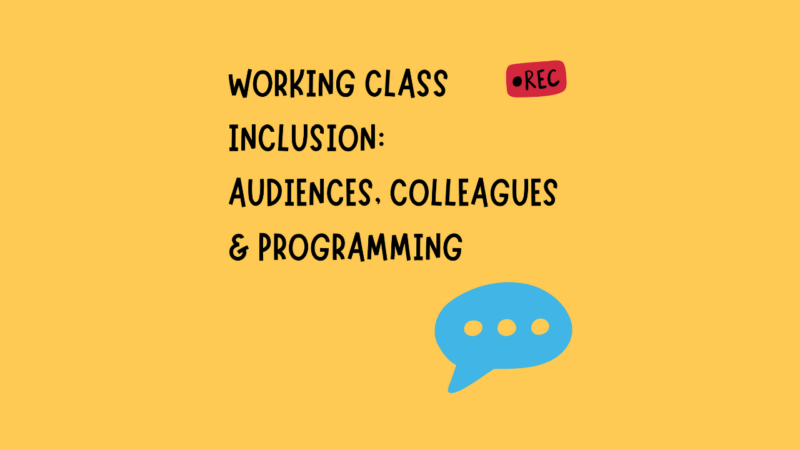- For more information, images and interviews please contact Linnea Pettersson: [email protected] / +44 (0) 7711254677

Working Class Inclusion
New resource published focusing on creating better experiences in cinema spaces for those from working-class backgrounds and/or those in poverty.
Working Class Inclusion: Audiences, Colleagues & Programming is a free resource to help cinemas be more inclusive.
Inclusive Cinema is launching a new free resource: Working Class Inclusion: Audiences, Colleagues & Programming, providing information and guidance to support exhibitors in improving cinema experiences for working-class people and those in poverty.
The resource comprises a series of six podcast episodes that cover a range of areas, from sliding-scale ticketing and equitable employment practices, to the films that are programmed and how they are presented. There is also an access and inclusion checklist to support venues, festivals, industry initiatives and event organisers with strategic and operational measures to welcome working-class audiences and colleagues.
Addressing the wider social context and responding to the omission of class or socio-economic position in the UK’s 2010 Equality Act, Dr Leanne Dawson (equality, diversity, and inclusion consultant, author, and academic in Screen Studies) was commissioned to explore the impact of cultural, social, and economic barriers on working-class people and their engagement with independent cinemas and pursuing careers in the industry.
Through sharing research and personal experiences, the series provides practical guidance and encouragement for organisations, outlining how positive interventions can lead to increased diversity across audiences and the workforce. It looks at the definition of ‘working-class,’ which groups many different experiences together — some people raised in poverty, others not, some in towns, some rurally, some with multiple diverse characteristics — and considers social mobility between classes and the impacts of financial income and cultural capital to participation in independent cinema.
Checklists outlining inclusion strategies and measures will accompany the podcasts. A film programming resource will also highlight the rich diversity of working-class stories and talent behind and in front of the camera, covering fiction features, documentary and short film. This will be complemented by ideas to make screenings available and more welcoming to working-class audiences, colleagues, as well as creatives, resulting in a deeper engagement with independent films and venues. Booking details and information on access materials, such as descriptive subtitles and audio description, will also be provided where possible.
Dr. Dawson explains why putting this resource together should be helpful to the exhibition sector:
I really want to help you make your cinema, festival, screening, or event as welcoming as possible to all working-class people. This series of resources comprises podcasts offering practical tips on how to attract and welcome more working class people and accompanying checklist documents that can be easily used to note what you’re currently doing well and what could be further improved on your journey to working-class inclusion.
Resource topics include:
- Why working-class people feel excluded: exploring how class intersects with other parts of identity and why many people who are working-class may feel excluded from independent cinema/film festival spaces and why measures are needed.
- Free and broader measures that can be put in place to increase inclusion and access, from practical no-cost changes to budgeted interventions for welcoming more working-class audience members and colleagues.
- How advertising, outreach, sliding scale ticketing and ‘pay it forward’ models to attract and retain working-class audiences.
- How inclusive programming should take into consideration the types of stories and identities being shown, who is making programming decisions and how programming can provide space and support for established and aspiring working-class filmmakers.
- Guidance on staffing and how to attract, support, develop, and retain working-class colleagues at all levels.
The podcast and accompanying documents will be available through the Inclusive Cinema website on 1st March 2023: inclusivecinema.org
Inclusive Cinema is led by Film Hub Wales and supported by the BFI Film Audience Network (FAN) – using funds from the National Lottery to ensure the greatest choice of cinema is available to everyone across the UK. Funds in Wales are administered by FHW via Chapter as the Film Hub Lead Organisation.
More than £30M is raised each week for good causes across the UK by the National Lottery.

